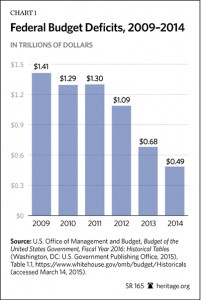Obama and Members of Congress Want Unrestrained Discretionary Spending Power
< < Go Back
President Barack Obama and Members of Congress in both parties want to end the budget caps and the sequester cuts that enforce those caps. President Obama called the caps “mindless austerity” when he released his budget in February.
These caps and sequester are a byproduct of the famous 2011 “debt ceiling” negotiations between Obama and House Speaker John Boehner (R-OH). Before those negotiations, the federal government was spending 24.4 percent of gross domestic product (GDP). In 2014, expenditures fell to 20.3 percent.
The Budget Control Act of 2011 (BCA), enacted on August 2, 2011, reestablished limits on discretionary spending through fiscal year (FY) 2021. Despite its flaws, the BCA has been one of the most successful lids on federal spending in modern times.
Under the existing caps:
– The budget deficit fell from the towering heights of more than $1.4 trillion of red ink in 2009 to less than $500 billion in 2014.
– The BCA budget cuts made possible the drop in total federal outlays (in nominal dollars) from $3.603 trillion in 2011 to $3.506 trillion through FY 2014.
– The caps have restrained discretionary spending. After peaking in 2011 at $1.347 trillion, discretionary spending has been sliced and diced to $1.179 trillion in 2014—a 12.5 percent three-year cut in agency spending, not from the baselines but in nominal dollars spent. Adjusting for inflation, these programs have been cut by 16 percent.
If President Obama engineers another end run around the caps with his proposed $74 billion in new spending this year and $362 billion over five years, the discipline of the BCA will be forever lost, and we will be back to the free-for-all of 2009 and 2010. If, instead of accepting Obama’s spending binge offer, Republicans can hold to the caps and allow sequester cuts if spending comes in over target, the fiscal picture continues to improve.
More From NCPA:




